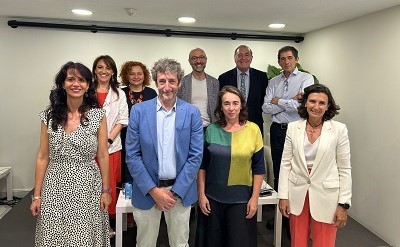- Red2Red and Fundación Cepsa have presented in Madrid the first state report of the Just Transition Observatory on the perception of the ecological transition in Spain. The analysis was presented with the aim of analyzing the fair transition process and bringing visibility to the perception of individuals and stakeholders
- The study entitled "Social perception of the ecological transition in Spain, 2022-2023" reveals that 51% of the population surveyed acknowledges not knowing or having a very vague concept of what the "ecological transition" means. At the same time, 53% believe that the energy transition process could have a positive impact
- The report highlights the importance of increasing awareness of the opportunities that the energy transition can bring, while at the same time working to reduce potential risks of social unrest associated with the potential loss of employment in some sectors, if action is not taken in advance
- Women and young people (between 18 and 34 years old) have a more optimistic view of the energy transition process and show a high willingness to adopt environmentally responsible behaviors
- Full report: download
Fifty-one percent of the Spanish population surveyed acknowledges not knowing or having a very vague concept of what the "ecological transition" means. The study points to two types of profiles, climate change "non-actors" (17%) and "skeptics" (6%) who have a very low level of certainty about the existence of climate change. In this regard, the report recommends promoting communication strategies for information and awareness-raising to reach a social consensus in the ecological transition process.
This Observatory study indicates that 60% of the Spanish population believes that this process can offer new employment opportunities and services that will allow for greater socioeconomic development in their area, and 53% believe that this process will affect their environment positively or very positively. Additionally, 65% of the public said that the fight against climate change should be a priority for action.
Additionally, the report detects potential risks of social conflict associated with the loss of employment in some sectors, if action is not taken in advance. In this regard, according to the report, the Spanish population believes that the responsibility for making decisions regarding the ecological transition process should be shared between public administration, supranational organizations, and companies.
Anabel Suso, coordinator of the report and director of Public Policy Innovation at Red2Red, indicates that "the agents involved in the ecological transition process should take note of both the notable lack of knowledge of the population about this process and the clear demand of citizens to be heard and participate in the planning and decision-making processes in the area."
Teresa Mañueco, vice-president of Fundación Cepsa, points out that "Spain is a strategic territory to develop new renewable energy sources. This process must be carried out with the collaboration of all stakeholders to ensure social inclusion. We must know what citizens and stakeholders think about this transformation process and share proposals for the future to promote a just transition."
Among the environmental problems most frequently mentioned by citizens are air pollution and drought. Along these lines, the report indicates that men, people with no education or only primary education, and the population with occupations linked to the transport or storage sector fear that they will be the most affected by this transformation process.
The report highlights that young people (between 18 and 34 years of age), people with a high level of education, and residents in urban environments have a more optimistic outlook of this transformation process. In addition, the young population is the most willing to contribute to the fight against climate change through their actions. The study also concludes that women and young people have a more optimistic outlook of the energy transition process and show a high willingness to adopt environmentally responsible behaviors and that, in general, they show greater willingness than men to adopt pro-environmental behaviors.
The report was presented in Madrid by academic and social leaders such as Laura Martín Murillo (Director of the Just Transition Institute), Anabel Suso (Director of Public Policy Innovation at Red2Red), Beatriz Novales (Oxfam), Carlos Mataix (Director of the Center for Innovation in Technology for Human Development at the Polytechnic University of Madrid) and Cristina Monge (climate change expert and member of the advisory board of Fundación Cepsa ).
This report is the second project of the Just Transition Observatory, which already launched a previous study on the perception of the ecological transition in Andalusia. The Observatory is a space for reflection and shared knowledge that has been created to manage change, prevent potential conflicts, and generate joint conclusions and recommendations for decision-making.
Methodology of the study
To carry out the study, telephone surveys were conducted with more than 3,000 people from different Autonomous Communities who were asked about the following dimensions of analysis:
- knowledge and general perception of the ecological transition process.
- The perception of the global and specific impact of the ecological and energy transition process on the territory, and especially on the economy and employment, the environment, and on the population's daily life and consumption.
- The attitudes of the population in terms of responsibility and desire to participate in the decision-making process (governance system).

